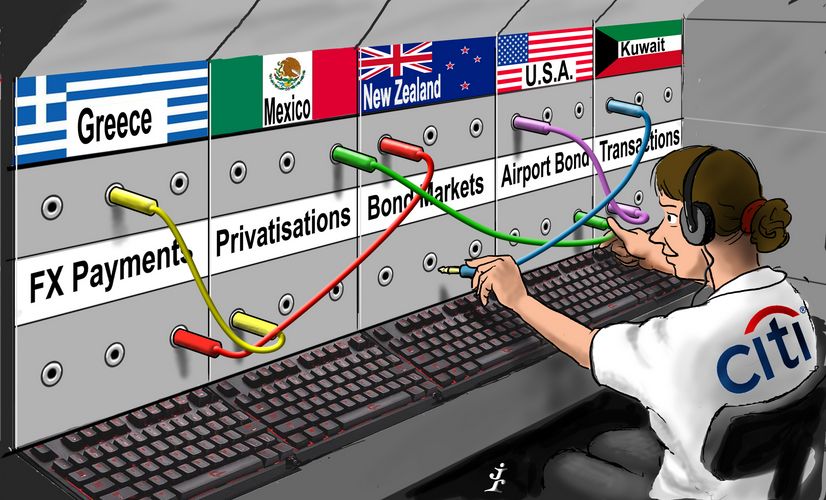Global connections
Its unrivalled global presence and prowess across the entire spectrum of banking have long marked out Citigroup as a vital partner for public sector clients. But in 2017 it took that a step further, leveraging its assets to create some landmark and often innovative solutions for governments – often against strong headwinds. Citigroup is IFR’s Bank of the Year for Governments.
With a physical presence in almost 100 countries and a coverage list including 60 more, no other bank on the planet comes close to the reach of Citigroup. From Abidjan to Dhaka, Tegucigalpa to Kiev, Yaounde to Colombo, having bankers on the ground – living, working, socialising alongside clients – puts the firm one step ahead of rivals in winning public sector business even before the formal pitching process has begun.
But it is how the bank leverages that physical network that puts it ahead of the dozens of other investment banks vying for that same work. For more than a decade, it has been coordinating efforts on the ground via a global public sector group team set up by Stanley Fischer, former governor of the Bank of Israel and vice-chairman of the US Federal Reserve, during his tenure at Citigroup during the early 2000s.
Now headed by Julie Monaco in New York, the PSG franchise is split into four regions – North America, the bank’s most important and lucrative region, Latin America, EMEA and Asia-Pacific. Chief country officers on the ground are given responsibility for public sector clients in their jurisdiction, but it is the global and regional PSG teams that co-ordinate the deals and transactions that underpin those relationships.
Drawing on Citigroup’s unrivalled breadth of businesses that span financing, advisory, risk management, treasury and trade, PSG co-ordinates solutions for those clients, with the CCO always there as a link between the client and the larger Citigroup engine. With almost 100 CCOs managing public sector clients, the set-up helps to solidify relationships and keep the PSG team informed of any issues or sensitivities.
“You need to be able to fly in your very specific talent and ideas and specialties, but you need to be very connected on the ground – you need to be geographically, linguistically, culturally and educationally connected to those governments,” said David Walker, who has been head of PSG in EMEA for the past two years, and previously chief operating officer and head of corporate broking in the bank’s UK business.
Milestone agreement
That physical presence has helped it win several important mandates. In Greece, where Citigroup has remained despite eight years of economic crisis there, the bank advised the country on its largest privatisation to-date: the €1.4bn sale of 14 regional airports. A joint bid by Fraport and Slentel, a subsidiary of Greek energy firm Copelouzos, won the 40-year concession and the deal was approved in March.
The Hellenic Republic Asset Development Fund, which managed the sale, called the transaction a “milestone agreement”. Launched in 2013, the deal had to vie with some of the most difficult financial conditions imaginable, including the shuttering of Greek banks and the launch of capital controls two years ago. Nonetheless, the deal – the third-largest foreign investment into Greece ever – went through.
“Yes, we have a strong advisory franchise, but we are also the largest foreign bank on the ground – we have been on the ground in Greece for over 50 years, notwithstanding the country’s travails,” said Walker. “We have stayed there, we have continued to service the government, central bank and as much of the inbound and outbound activity as we possibly can.”
Elsewhere in the region, Citigroup has shown its commitment to governments and state-owned enterprises during their moments of need. Ukraine is one example, where the bank – together with Deutsche Bank – extended a US$500m revolving credit facility to state energy firm Naftogaz in January, enabling the cash-strapped country to buy gas to see it through the winter.
As the only major foreign bank with a physical presence there, Citigroup already had strong relationships on the ground. It worked for six months with Naftogaz on the transaction before Deutsche Bank was also mandated.
“It was an enormously difficult deal, and syndication took many many months,” said Georgi Yordanov, head of public sector for the bank in Central and Eastern Europe, Turkey and Israel.
Sovereign issuance
On the bond side, the bank has led on many of the landmark sovereign deals of the year. It was lead-left on Kuwait’s debut US$8bn transaction in March, which drew a blowout US$29bn of demand; on Tajikistan’s inaugural US$500m bond in September; on eagerly awaited market returns from Nigeria, Oman and Egypt; and US$3bn of sukuk from Bahrain, which attracted record demand despite difficult market conditions.
The Middle East has provided a huge amount of sovereign bond supply this year, and Citigroup has been on almost every one of those deals. As revenues from petrodollars have ebbed, many countries in the region have been turning to debt capital markets to fill yawning fiscal holes. It has successfully capitalised on its relationships – and rebuilt old ones, as in Saudi Arabia – to win business coming from the region.
But the PSG team has drawn on the bank’s wider financing expertise to additionally raise funds for governments in the Middle East away from bond markets. In Oman, it was the first bank to be mandated on a US$600m loan to the country’s sovereign wealth fund that was used to allow the government in Muscat to monetise a 51% stake in the country’s main telecommunications company.
Citigroup’s breadth of financing expertise has allowed it to come up with innovative solutions for governments. In Mexico, it was global coordinator on a US$4bn two-tranche Green bond issue used to finance a new airport in the capital. The deal, which raised finance at arm’s length from the government, was backed by fees from the capital’s existing airport – removing the construction risk for investors.
The deal was one of the biggest seen from Mexico, and came despite tensions between Mexico and its main trading partner to the north. It was the largest non-recourse single-asset infrastructure bond issue ever seen, and the largest airport bond offering. The deal has since become a template, with Citigroup now working on similar transactions for Dubai’s new airport and Expo 2020 exhibition site.
“The key thing we really brought to this was our project infrastructure competencies and capabilities,” said Walker, with reference to the Mexico City Airport bonds, which came to market in April. “We are very proud of the role we played here, and as a result we are now playing a role in similar transactions which are currently ongoing, and which will probably show as 2018 business.”
Government efficiencies
Citigroup’s work with governments extends well beyond just financing, however. As the world’s largest, systemic US dollar-clearing bank, it is a key part of the planet’s financial plumbing, and has some big transactional banking mandates – not least in the US, where it is a partner for some of the biggest federal government departments, providing payments, pensions, charge cards and collections.
Because of its global presence, it is ideally placed to help governments around the world with international payments and collections. The New Zealand government, for example, picked Citigroup to help manage the complexities of collecting student loan payments from graduates around the world. Accrued fees and foreign exchange charges meant payments received by Wellington often didn’t match up to amounts due.
The bank went above and beyond with its solution. It designed a new platform for graduates worldwide to make payments to their local Citigroup branch, removing the need for them to make cross-border payments and incur fees. Wellington, in turn, would then receive the payments in New Zealand dollars at the market rate rather than heavily marked-down rates used in bank transfers.
“They came to Citi effectively for help with foreign exchange transactions … but the actual scale of the problem that they had was much bigger than what we initially understood,” said Lydia Brian, a senior analyst within the PSG group. “They were having difficulties tracking and matching a lot of the payments … in some cases the government wasn’t receiving the correct amount.”
“They are now looking at extending that into other departments,” she added.
To see the digital version of this review, please click here.
To purchase printed copies or a PDF of this review, please email gloria.balbastro@tr.com.



